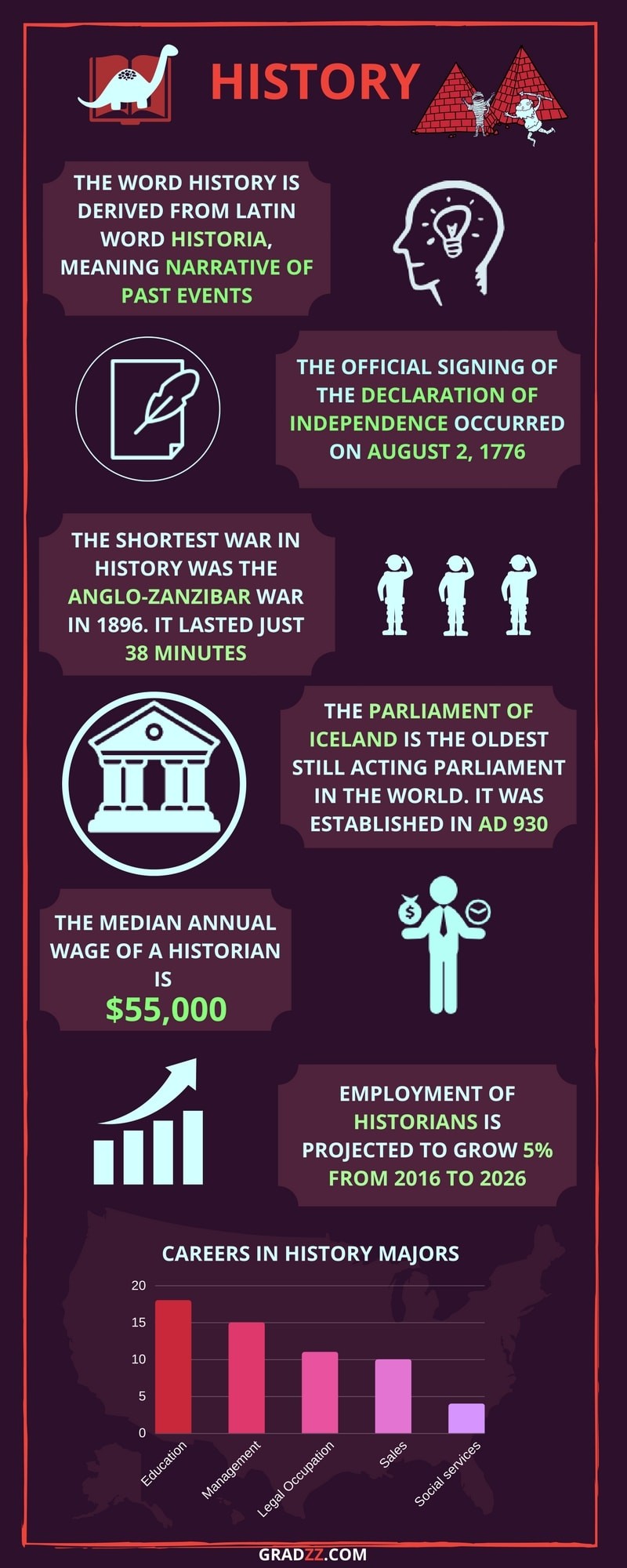History Degree, Requirements, Tuition Cost, Jobs and Salary
About History
What is History?
History is the field of study comprising the past and other related shreds of evidence of past. History can be narrated as the tremendous story of the past. It gives you a sense of evidence of the lives and the evidence to our future life. It tells us what it means to be human and highlights the great achievements and the great follies of human lives. History also gives us lessons about how one human being should be self-organized and how to manage our society and surrounding people, for the betterment of all.
Ralph Waldo Emerson quoted that "There is properly no history; only biography". History can be defined as the theory of at least the realm of fiction and myths of legends and legendaries. Different nations have different propaganda for their own nationalism.
Online Education in History
-
Studying world history courses through online classes will cover a variety of subjects from ancient to modern history. Topics include ancient Greek history, European Art History, Religion in History, Human Evolution and much more.
-
There are numerous fields that require history: law, gender, and sexual orientation studies, reasoning and morals, and even writing.
-
Online courses offer the adaptability to concentrate from anyplace and whenever over the Internet
-
Whether you major in history or not, you have the option of taking online college history courses.
-
If taken through an accredited institution, these classes can often be applied as a credit to a degree. The U.S. Department of Education provides a database of accredited schools.
-
Free online courses don't generally lead to credit, so degree-seekers might want to look for online courses that include an option for credit.
Why study History?
Study of History is not limited to just memorizing the facts related to significant historical events. It is extremely diverse and involves the following features.
-
Studying and analyzing historical events
-
Analyzing the overall impact of historic occurrences, trends, and artifacts on the world
-
Evolving efficient communication, reading, and public speaking skills
-
In-depth research in your specialized area of interest
-
History helps to understand the framework and insights of our world.
-
We get to learn about the cultures of the world and respect them.
-
Studying history helps us to understand the changes and learn to judge wisely about the happenings in the world.
-
History repeats itself! So it's better to learn from our past mistakes.
Specializations in History
-
African History
-
It is a gigantic and complex subject, world-shaking occasions have molded its history, from the early men who left their strides in volcanic remains to the freedom of Nelson Mandela, and a whole lot of wars, conquests, civilizations, and revolutions in between.
-
American History
-
American History to 1877- Gives us a chance to investigate the social, financial, social, political, military, and lawful history between first contacts and native Americans.
-
US History since 1877- Concentrates on the improvement of the United States since 1877, sequentially dissecting the general population, occasions, and powers that made American what it is today.
-
European History
-
Early Modern European History: The 16th century was a period of vigorous economic expansion. This expansion played a major role in the many transformations like social, political, and culture of the early modern age.
-
Modern European History Represents the diversity of Europe's recent past.
-
Islamic History
-
includes Islam, Muhammad and the Muslim era, Muslims and Mecca, Muhammad and caliphs, Ali.
-
Latin American History
-
The pre-Columbian period and including from colonization by the Spanish and Portuguese start in the fifteenth century to the improvements of the twentieth century
-
Native American History
-
It deals with the history of Ice Age, the descendants who discovered Native America.
History Careers
A number of history degrees jobs are open up for those having a degree in the field of history and related subject area. Let us start with what you can do after having done your majors.
Entry level jobs for History Majors
In contrary to common belief, history careers are not confined to becoming a historian or teaching history in a college or school. Let us explore the opportunities that are waiting for you.
-
Geographer - Understanding world history and its impact allow you to have in-depth knowledge about various geographical locations as well, which can help you in this profession.
-
Archivist - They take care of historical documents. Their primary responsibility is to authenticate and preserve documents.
-
Museum Technician - They assist curators in evaluating collections and helping them to make it available for display. They keep note of every item being stored in the museum.
-
Proofreader - A sound knowledge of history can land you a job in cultural and political journals where you can proofread history related articles.
History degree jobs in government
Besides joining the Civil Administrative services or teaching in a state or public university, there are many other jobs in the government sector which are given.
-
Archaeologist - Study the excavation sites, monuments and many other historical sites, gather data about them, evaluate those items and prepare a report regarding these sites. They care for permanent records and historically valuable documents such as letters, diaries, clippings, legal documents, maps, films, videos, sound recordings, and other records. They may also take part in research activities based on archival materials.
-
Historian - Conducting research work and Digging deep to analyze what is hidden in the past.
-
Political scientist - Understand the trend in the current political environment and co-relate it with the historical events to advise the government.
-
Museum curator - They oversee the museums' collections including the sale of certain items and also categorize and evaluate the things kept in the museum.
-
Librarian - Official bookkeeper in the government libraries. main duties include preserving and maintaining historical books and journals. They collect, catalog, and organize information.
-
Curators - Curators run the educational, research, and public service activities of museums, zoos, and other institutions. They work closely with museum educators, zookeepers, publicists, and publishers to produce exhibits, special events, and publications.
Other History jobs
Students who study history in the United States have nearly endless career options open to them. Some of these career options include:
Teachers
-
Elementary, middle, and high school teachers work in public or private schools, imparting knowledge to their students and trying to instill in them a love of learning.
-
Historians
-
Historians collect and interpret materials from the past.
-
They use these materials to answer questions about the importance of historical events, their causes, and their effects.
-
Anthropologists
-
Anthropologists use historical evidence and contexts in order to study the behavior and interactions of human populations throughout history, up to the modern age.
History degree jobs and salary
Having only an undergraduate degree in history might not be enough to find a lucrative paying job. However, once you have completed your masters in a history major, then a lot of exciting options with high pay will open up for you.
The table shows the average salary earned if you take up these particular jobs.
| History Jobs and Associated Salaries | |
| Job Position | Average Salary |
| Middle School Teacher | $47,831 |
| Assistant Professor | $49,382 |
| Archivist | $49,495 |
| High School Teacher | $50,231 |
| Non-Profit Executive Director | $63,500 |
| Executive Assistant | $45,000 |
Conclusion
History, studying it makes one independent because we learn in and out of the world; its actions and human behavior throughout. With history, we also study art, music and more. So, it is an overall development. In this article we provided details with the online courses, the reason to study history, it's specializations and areas in which we can work.
Average Tuition and Cost for History Degrees
| Degree type | Total Tuition | Tuition Per Credit |
|---|---|---|
| Bachelors | $ 43545 | $ 423 |
| Associate | $ 12527 | $ 201 |
| Masters | $ 21045 | $ 588 |
| Doctorate | $ 39846 | $ 955 |
Degrees offered in History Degrees
Accreditation for History
Colleges Offering History Programs and Degrees

American Public University System
111 W Congress St, Charles Town, West Virginia 25414

El Camino College
16007 Crenshaw Blvd, Torrance, CA 90506, USA

Foothill College
12345 El Monte Road, Los Altos Hills, CA 94022

Emporia State University
1 Kellogg Circle, Emporia, Kansas 66801-5415

Regent University
1000 Regent University Dr, Virginia Beach, Virginia 23464

Walters State Community College
500 South Davy Crockett Parkway, Morristown, TN 37813-6899 United State

Northwestern University
633 Clark St, Evanston, Illinois 60208

Texas State University
601 University Dr, San Marcos, Texas 78666

Washington University in St. Louis
One Brookings Drive, Saint Louis, Missouri 63130-4899


